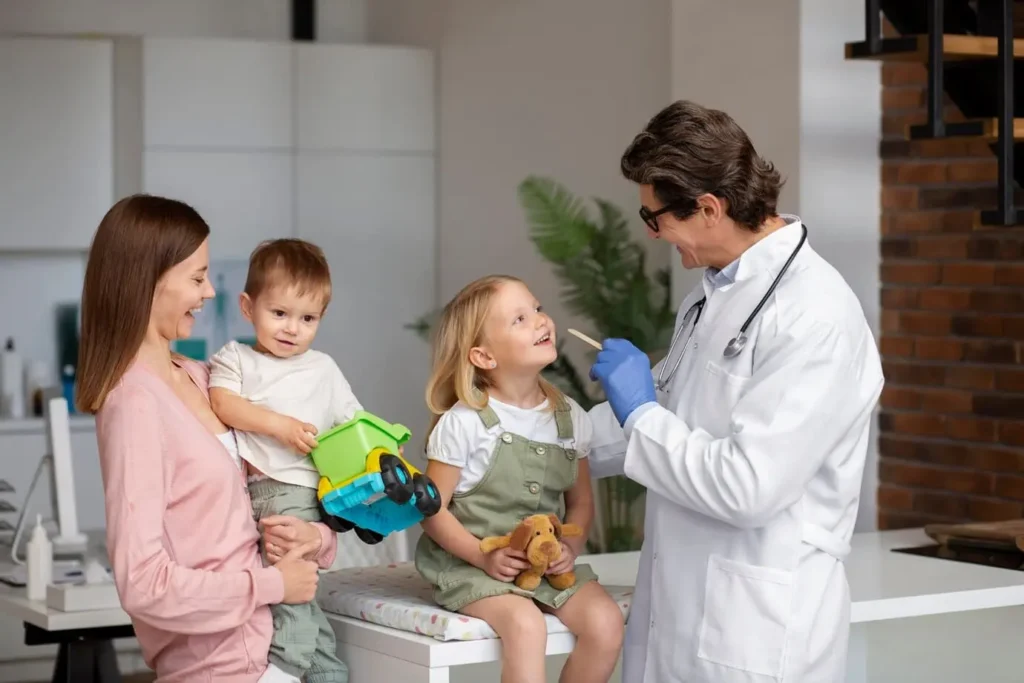
Finding the right pediatric office is essential for ensuring your child’s health and development. Pediatricians play a vital role in guiding families through every stage of their child’s growth, providing expert care tailored to young patients’ unique needs.
Whether it’s routine check-ups or specialized treatments, pediatricians in New Jersey, such as those at Fayrouz Pediatrics, are dedicated to fostering physical, emotional, and behavioral well-being. By choosing a trusted pediatric office, families can access the comprehensive care they need to help their children thrive.
What do pediatricians do?
Pediatricians are specialized medical doctors who focus on the physical, emotional, and social health of infants, children, adolescents, and young adults up to the age of 18 (and sometimes 21, depending on the region).
They are trained to diagnose and treat a wide range of childhood illnesses, from common colds to chronic conditions, while also monitoring growth and development milestones. Pediatricians serve as advocates for children’s health, offering guidance on proper nutrition, vaccinations, and preventive care.
Their role extends beyond clinical treatment, as they often collaborate with families to ensure a holistic approach to a child’s well-being.
Comprehensive Health Assessments
Comprehensive health assessments are essential in pediatric clinic providing a thorough evaluation of a child’s physical, emotional, and developmental well-being. During these assessments, pediatricians examine growth patterns, conduct child health checkups, and review vaccination histories to ensure children are healthy and thriving.
These visits also create a valuable opportunity for parents to discuss any concerns related to their child’s behavior, nutrition, or emotional health. By addressing these issues, pediatricians can offer personalized guidance and resources that support families in fostering their children’s overall well-being.
Preventive Healthcare Services
Preventive healthcare services are a cornerstone of effective pediatric care, designed to keep children healthy and prevent potential health issues before they arise. These services encompass a range of vital activities:

- Immunizations: Vaccine and Immunization Schedules are critical for Children are critical for protecting children from serious infectious diseases. Staying up-to-date with immunizations not only shields individual children but also contributes to community immunity, helping to prevent outbreaks.
- Routine Screenings: Regular health screenings are essential for monitoring a child’s growth and development. These assessments include checks for vision, hearing, and other critical health markers, allowing for early identification of any issues that may require intervention.
- Developmental Monitoring: Pediatricians conduct ongoing evaluations of a child’s developmental milestones to ensure they are meeting key growth targets. This proactive approach helps catch any developmental delays early on, facilitating timely support.
- Parental Guidance: Education plays a significant role in preventive care. Pediatricians provide families with information on nutrition, exercise, and healthy habits, empowering parents to foster environments that promote their children’s well-being.
By prioritizing these preventive measures, pediatric healthcare providers create a solid foundation for children’s health. This proactive approach not only enhances immediate well-being but also instills lifelong habits that contribute to a healthier future.
Managing Chronic Conditions in Pediatrics
Pediatricians play a crucial role in the management of chronic conditions affecting children, providing comprehensive care that addresses their unique medical needs. Conditions such as asthma, diabetes, epilepsy, and food allergies require ongoing attention and tailored treatment plans to ensure optimal health and quality of life.
During regular check-ups, pediatricians monitor the progression of these chronic conditions, making necessary adjustments to treatment protocols based on each child’s specific circumstances. They conduct thorough assessments to evaluate symptoms and the effectiveness of current management strategies, fostering open communication with families to ensure they understand their child’s condition.
Education is a vital component of chronic condition management. Pediatricians empower both children and their parents with knowledge about recognizing symptoms, administering medications, and implementing lifestyle changes that can enhance well-being. They also provide resources for managing day-to-day challenges, such as dietary considerations and activity limitations.
Moreover, pediatricians often collaborate with specialists, such as endocrinologists or pulmonologists, to create a holistic care plan that encompasses all aspects of a child’s health. This interdisciplinary approach ensures that every factor—physical, emotional, and social—is considered in the management of chronic conditions.
Addressing Behavioral and Emotional Health
Pediatricians are essential in addressing the behavioral and emotional health of children, recognizing that mental well-being is crucial for overall development. As children face various challenges—such as anxiety, depression, and social issues—early identification through routine check-ups becomes vital.
During visits, pediatricians create a welcoming space for children and their families to discuss emotional concerns. This open dialogue allows for better understanding and tailored support, which may include coping strategies or referrals to mental health specialists when needed.
Educating parents is also key. Pediatricians provide guidance on identifying signs of emotional distress and share effective strategies for fostering a supportive home environment. By empowering families with knowledge and resources, pediatricians enhance the child’s emotional resilience.
Additionally, collaboration with schools and community organizations ensures a holistic approach to behavioral health. This teamwork helps address challenges in various aspects of a child’s life.
Creating a Child-Friendly Environment

Establishing a child-friendly environment in pediatric clinic settings is essential for promoting positive health experiences. Such environments are designed to reduce anxiety and foster comfort, ensuring that children feel safe and supported during their visits.
Key elements of a child-friendly space include vibrant colors, engaging artwork, and age-appropriate toys, which help create an inviting atmosphere. Waiting areas should be equipped with books and interactive activities to keep children entertained, making their time in the clinic more enjoyable.
Moreover, the demeanor of healthcare staff plays a significant role. Pediatricians and nurses who are trained in child-friendly communication techniques can ease children’s fears and encourage them to express their concerns. Using gentle language and engaging with children at their eye level can significantly enhance their comfort.
Additionally, the layout of the clinic should prioritize accessibility, allowing children and their families to navigate the space easily. Designated play areas can also help children relax and engage in positive interactions with their peers.
Specialized Pediatricians: What Do Developmental Pediatricians Do?
While general pediatricians provide care for most of a child’s health needs, some children may benefit from seeing a specialist like a developmental pediatrician. These doctors focus on the unique challenges and conditions that affect a child’s growth, learning, and behavior.
What Is a Developmental Pediatrician?
A developmental pediatrician is a medical doctor who specializes in diagnosing and treating children with developmental, behavioral, and learning difficulties. They receive additional training in addressing conditions that impact a child’s ability to meet milestones or adapt to their environment.
What Do Developmental Pediatricians Do?
Developmental pediatricians evaluate and manage a wide range of issues, including:
- Developmental Delays:
- Delays in speech, motor skills, or social interactions.
- They assess the child’s developmental level compared to typical milestones.
- Behavioral Disorders:
- Diagnosing and managing conditions like Attention-Deficit/Hyperactivity Disorder (ADHD), autism spectrum disorders, and anxiety.
- Learning Disabilities:
- Identifying challenges like dyslexia or other learning differences that may affect academic performance.
- Complex Medical Conditions:
- Helping families address the developmental impact of conditions like prematurity, genetic disorders, or chronic illnesses.
When Should You See a Developmental Pediatrician?
Your general pediatrician may recommend seeing a developmental pediatrician if your child exhibits any of the following signs:
- Delayed speech or communication difficulties.
- Difficulty with motor skills such as walking, running, or grasping objects.
- Behavioral challenges, such as excessive tantrums, aggression, or difficulty focusing.
- Concerns from teachers or caregivers about learning or socialization at school.
What to Expect During an Appointment
A developmental pediatrician will typically:
- Review the child’s medical and family history.
- Conduct a thorough evaluation of the child’s developmental and behavioral progress.
- Collaborate with other specialists (e.g., therapists, educators) to create a comprehensive care plan.
- Provide guidance to parents on therapies, interventions, or educational supports.
If your child shows signs of developmental or behavioral issues, it’s important to consult a pediatric near you in NJ. Your general pediatrician can help assess whether a referral to a developmental pediatrician is necessary, ensuring your child receives specialized attention for any concerns related to speech delays, motor skills, or behavioral disorders.
How Developmental Pediatricians Help Families
Developmental pediatricians don’t just treat children—they support the entire family by:
- Explaining diagnoses in a way that parents can understand.
- Offering resources for therapies, such as speech or occupational therapy.
- Connecting families with educational programs or support groups tailored to their needs.
Seeing a developmental pediatrician can be a vital step in helping your child overcome challenges and thrive. By addressing developmental and behavioral concerns early, these specialists can make a meaningful difference in your child’s health, education, and overall well-being.
Finding Pediatricians in New Jersey
For families seeking pediatric care in New Jersey, there are numerous reputable options available. The state is home to several top-rated children’s hospitals and pediatric clinics, including:
Fayrouz Pediatrics has two offices in New Jersey:
- Clifton Office: 1135 Main Ave., Clifton, NJ 07011.
Telephone Number: 9739283388 - Paterson Office: 540 Straight St., Paterson, NJ 07503.
Telephone Number: (973) 928-3388
Both locations offer comprehensive pediatric services to meet your child’s healthcare needs.
FAQs About Pediatricians in NJ
Can a pediatrician diagnose anxiety?
Yes, pediatricians can identify signs of anxiety in children and may provide initial support or refer you to a child psychologist or psychiatrist for specialized care.
How often do you see a pediatrician with a newborn?
Newborns typically visit the pediatrician multiple times during their first year, including at 2 weeks, 1 month, and then at 2, 4, 6, 9, and 12 months for routine checkups and vaccinations.
What age do you stop going to a pediatrician?
Most children transition to a general practitioner or family doctor around age 18, though some pediatricians provide care until age 21.
Do I need a pediatrician before the baby is born?
Yes, choosing a pediatrician before your baby is born ensures you have someone to provide immediate care and guidance after delivery.
Does a pediatrician pierce ears?
Some pediatricians offer ear-piercing services, especially for infants and children, as it ensures a sterile and safe environment.
Check Ear Piercings Service in New Jersey with Fayrouz Clinic
Can a pediatrician refuse care if you don’t vaccinate?
Pediatricians may refuse non-emergency care if families choose not to follow vaccination guidelines, as this may pose risks to other patients.
Check Vaccine and Immunization Service in New Jersy with Fayrouz Clinic.
When to pick a pediatrician during pregnancy?
It’s ideal to choose a pediatrician by the third trimester of your pregnancy, so you’re prepared when your baby arrives.
When to call the pediatrician?
Call your pediatrician if your child has a fever, unusual symptoms, feeding issues, or any health concerns you’re unsure about.
Contact Fayrouz Clinic near you in New Jersey for Your Child’s Medical Care
What to ask the pediatrician for a newborn?
Ask about feeding, sleeping patterns, vaccinations, and any concerns you have about your baby’s health or development.
When should I find a pediatrician for my baby?
It’s recommended to find a pediatrician by the 7th or 8th month of pregnancy to ensure you’re ready when your baby is born.
Can a pediatrician diagnose autism?
Yes, pediatricians can identify early signs of autism through developmental screenings and may refer your child to specialists for a formal diagnosis.
Can a pediatrician diagnose ADHD?
Pediatricians can assess children for ADHD by evaluating their behavior and history and may recommend further testing or treatment.
Check our ADHD Evaluation Service in New Jersey with Fayrouz Clinic.
Do you need a pediatrician before leaving the hospital?
Yes, hospitals often require you to provide the name of a pediatrician before discharge to schedule the first newborn checkup.
Conclusion
In conclusion, the long-term impact of pediatric clinic is profound, shaping the foundation for a child’s health and development. Consistent and comprehensive pediatric services not only address immediate health concerns but also promote lifelong wellness. By focusing on preventive care, developmental assessments, and emotional support, pediatricians equip children with the tools they need to thrive.
Early interventions and ongoing monitoring foster resilience, helping children navigate challenges effectively. Additionally, the education and resources provided to families empower them to make informed decisions about their children’s health.